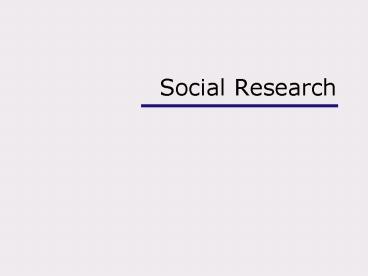Social Research PowerPoint PPT Presentation
Title: Social Research
1
Social Research
2
Nonscientific Sources of Knowledge
- Intuition
- Common sense
- Authority
- Tradition
3
Criteria For a Cause-and-effect Relationship
- Change in independent variable must be associated
with a change in dependent variable. - The correlation must not be due to the effects of
a third variable. - The independent variable must always occur before
the dependent variable.
4
Surveys
- Can draw on large samples
- Quantitative
- Include many variables
- Relatively precise
- Permit the comparison of responses.
5
Precollected data
- Permits high quality research.
- Low cost
- Reveals changes in variables over an extended
period of time.
6
Positive and Negative Correlations
7
Mode, Mean, and Median of Salaries
8
Research Methods Surveys
Advantages
Precision and comparability of answers. Use of statistical techniques. Information on large numbers of people. Detailed analysis.
9
Research Methods Surveys
Disadvantages
Expensive Low response rate. Phrasing of questions introduces bias in favor of certain answers. Researchers behavior can affect answers given.
10
Research Methods Secondary analysis
Advantages
Inexpensive. Can study a topic over a long period of time. Researchers influence on subjects avoided.
11
Research Methods Secondary analysis
Disadvantages
Information collected for a different reason may not suit researchers needs. Original researcher may have introduced biases. Information may be outdated.
12
Research Methods Experiment
Advantages
Can be replicated. Variables can be manipulated. Inexpensive. Permits establishment of causation.
13
Research Methods Experiment
Disadvantages
Environment is artificial. Not suited to most sociological research. Number of variables studied
14
Research MethodsCase Study
Advantages
Provides depth of understanding from members view. Unexpected discoveries and insights can be incorporated. Permits study of social behavior not feasible with quantitative methods.
15
Research MethodsCase Study
Disadvantages
Difficult to generalize findings from one group to another. Presence of researcher can influence results. Hard to duplicate. Takes lots of time. Difficult to be accepted as a group member.
16
Steps in the Research model
- Identifying the problem.
- Reviewing the literature.
- Formulating hypotheses.
- Developing a research design.
- Collecting data.
- Analyzing data.
- Stating findings and conclusions.
17
Ethics and Sociological Research
- Sociologists are committed to
- Objectivity
- Highest technical research standards
- Accurate reporting of their methods and findings
- Protection of the rights, privacy, integrity,
dignity, and autonomy of the subjects of their
research.

